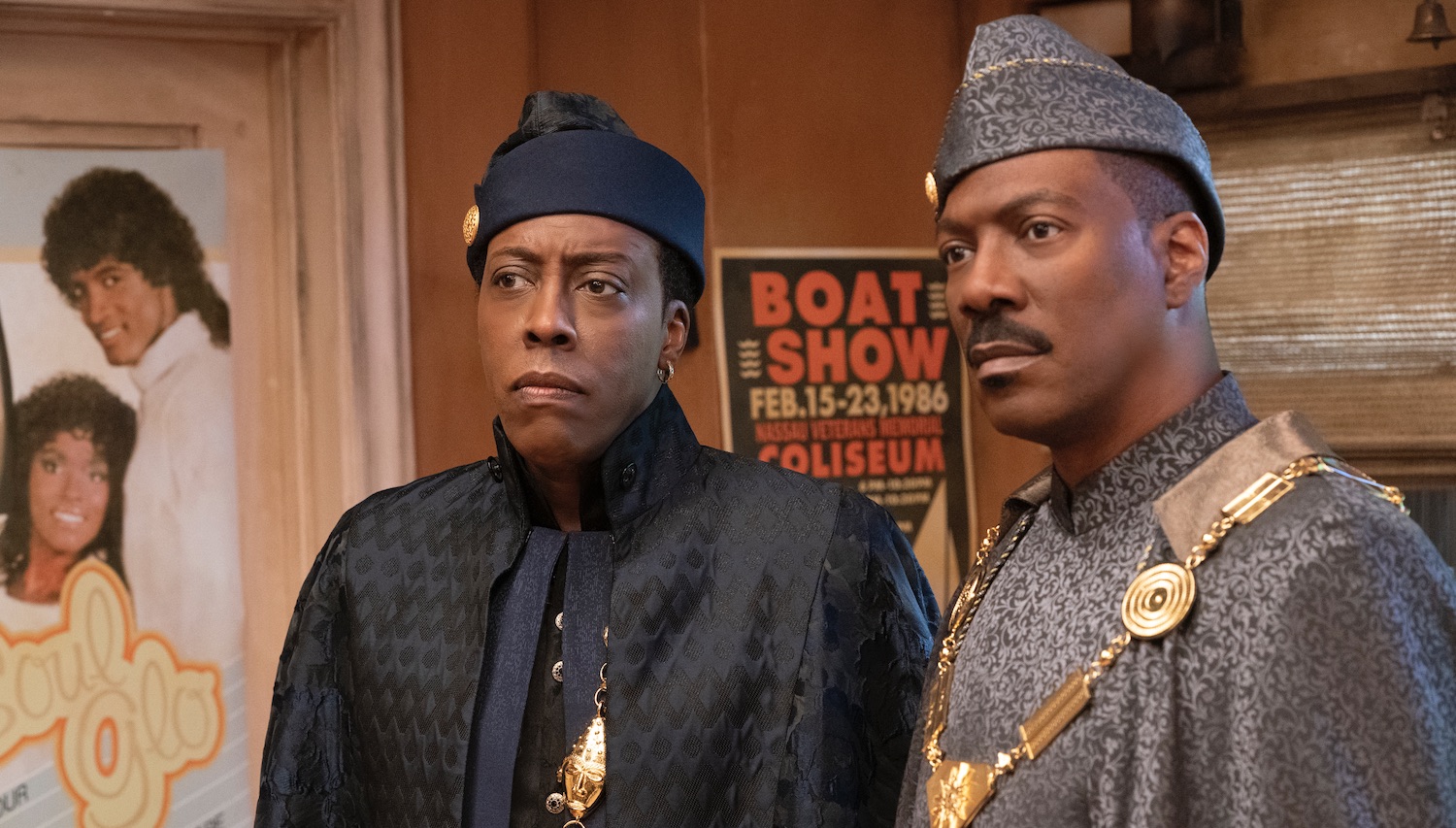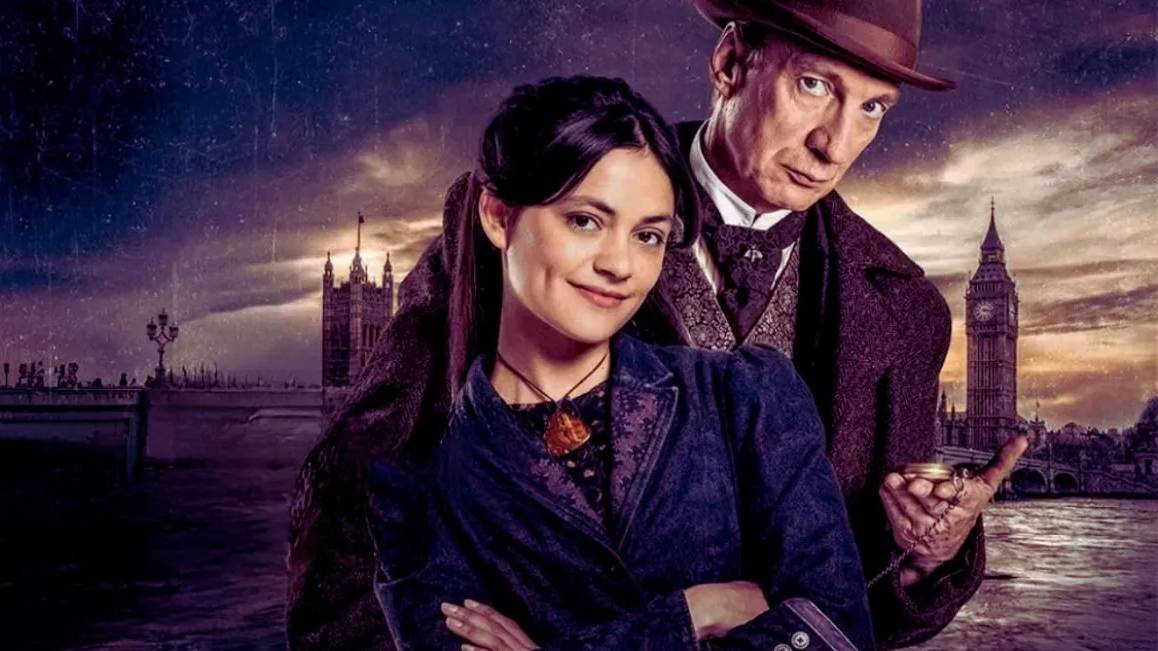What to Watch Verdict
Brewer's film feels like a missed opportunity to deepen the legacy of the original film, which celebrated blackness and the culture of the African diaspora.
Pros
- +
🔸 A script by Kenya Barris and original writers Barry W. Blaustein and David Sheffield cleverly revisits many iconic moments from the original film.
- +
🔸 Murphy and Hall bring their many characters back to life with the same humor and unpredictability as before.
Cons
- -
🔸 The choice to explore a regressive story about a male heir after introducing three royal daughters worthy of their own story undercuts the original film's progressive humor.
- -
🔸 Brewer's direction renders the colorful vitality of the fictional country of Zamunda with the overlit blandness of a television sitcom.
Watching his older movies, Eddie Murphy is an actor and comedian you want to see make a comeback; his chops in Dolemite is My Name and on Saturday Night Live are sharp as ever, especially as in cases like those two where he gets out of the way of his ego. But even if Craig Brewer’s follow-up to Coming to America is too restrained and polished to descend into a Nutty Professor II: The Klumps or Dr. Dolittle 2-style trainwreck, Coming 2 America sadly does not rekindle the manic energy and tightrope-walk of Murphy’s best work. Where he once effortlessly balanced raunchy humor and earnest sentimentality, Murphy seems oddly restrained by a sense of reverence for the previous film — so much so that he acquiesces to rehashing its central themes and several major plot points rather than moving forward by its example and forging new territory. Meanwhile, Brewer revives characters large and small from the original Coming to America alongside an expanded new ensemble that never congeals into the kind of eclectic-but-cohesive whole that John Landis
Murphy once again plays Prince Akeem Joffer, heir to the throne of Zamunda after his father King Jaffe’s (James Earl Jones) funeral, which Jaffe throws for himself while still alive. Akeem and his American bride Lisa (Shari Headley) have successfully raised three daughters, but in his country’s patriarchal society, even his oldest, the poised and intelligent Meeka (Kiki Layne), cannot ascend the throne. But when Akeem’s mischievous confidante Semmi (Arsenio Hall) informs him that he had a one-night stand that resulted in a child during their trip to Queens back in 1988, they travel back to America to find the young man who, though illegitimate, can become Zamunda’s rightful king.
The pressure is on to find Lavelle (Jermaine Fowler) after General Izzi (Wesley Snipes), the leader of neighboring Nextdoria, seeks retribution for Akeem's humiliating rejection of his sister Imani (Vanessa Bell Calloway) 32 years ago on their intended wedding night. Bringing Lavelle and his mother Mary (Leslie Jones) to Zamunda, Akeem prepares the young man to inherit his crown, even as Meeka protests after her own lifetime of preparation for the role of leadership. But when Lavelle begins to develop feelings for Mirembe (Nomzamo Mbatha), a royal groomer who prepares him for his new duties, the heir apparent begins to question the responsibilities he’s set to inherit, including an arranged marriage to Izzi’s daughter Bopoto (Teyana Taylor), whose practiced obedience fails to challenge him in the way he wants from a true partner and equal.
One supposes the biggest foundational problem in a follow-up to Coming to America that is meant to be a second star vehicle for Eddie Murphy is the fact that Prince Akeem is just not a very interesting character, certainly after falling in love and being reinstalled in Zamunda. The original film’s charm exuded from these distantly educated, aristocratic characters experiencing the culture shock of blue-collar New York with a sense of innocence and delight; watching a prince reckon with whether or not to uphold centuries-old chauvinistic traditions from the lap of absolute opulence just doesn’t generate the same kind of dramatic momentum. Like a lot of “legacyquels,” the new film has to regress more than a little bit to generate a new story out of a previously satisfying resolution, which means screenwriters Kenya Barris, Barry W. Blaustein and David Sheffield introduce a fully operational, automatically engaging idea — a prince who broke tradition by seeking true love outside of an arranged marriage does so again by raising three strong, intelligent women to inherit the throne — and then sabotages it to force a reverse culture-shock scenario by bringing in a male heir under extremely dubious circumstances.
Certainly there are opportunities with that concept, especially if Lavelle was more of a mirror image of the father he never knew — smart, modest and understated, making the affluence and indulgence of palace life, complete with naked royal bathers, an adjustment he resists in order to preserve his sense of identity. But even with Leslie Jones next to him, amplifying the comedic potential of every scene they’re in, Lavelle’s Zamundan experience unfolds more like a rap video come to life for the self-proclaimed bootstrapper than an unwelcome gift of privilege for a young man determined to define success on his own terms. Meanwhile, casting Kiki Layne as Meeka only makes you want to see her more in the role and in the film, but she’s depressingly sidelined to make room for a predictable romance between Fowler’s Lavelle and Mbatha’s Mirembe.
Brewer has more technology than director John Landis did back in 1988 to allow Murphy and Hall opportunities to star alongside themselves in scenes, but what’s remarkable is how much more dimensionalized those scenes were then than now; Landis played with the different characters but they all felt real, and felt like they were in the same space, while scenes here unfold like a revolving door counting down to the appearance of the next alter ego. Moreover, Coming 2 America blasts through the screen with the flat lighting of a sitcom, reducing production designers Jefferson Sage and Bledsoe Sophia’s elaborate sets to cheap soundstage backdrops. Whether or not the production could utilize any of the locations from the original film, cinematographer Joe ‘Jody’ Williams illuminates everything so brightly that there’s no depth within the frame, and painfully, none of the scale that made the kingdom of Zamunda so tactile and believable in 1988.
Ultimately, the movie is not without charm, but for a sequel to a movie that blazed a cultural trail almost without seeming to realize it — presaging the celebratory Afrofuturism of Black Panther by more than 30 years, Brewer’s update lacks the kind of cohesion and authority that made its predecessor worth imitating. Instead, even with Murphy and Hall shuffling through their paces with not just the old characters they played, but a few new ones, it feels content to revisit the elements that worked before without truly understanding them and picking up that torch for a new generation, both within the film and to audiences. That said, it doesn’t cheapen the charm or iconography of the first film, which may sound like damning it with faint praise, but if what you want from a sequel is simply “more of the same,” then it delivers handily, and respectfully. But ultimately, by choosing to look back more than it looks forward, Coming 2 America serves as a reminder how vividly the original film celebrated blackness and the African diaspora in an unapologetic and unprecedented way, and feels like a bit of a missed opportunity to deepen and expand that important legacy.
Todd Gilchrist is a Los Angeles-based film critic and entertainment journalist with more than 20 years’ experience for dozens of print and online outlets, including Variety, The Hollywood Reporter, Entertainment Weekly and Fangoria. An obsessive soundtrack collector, sneaker aficionado and member of the Los Angeles Film Critics Association, Todd currently lives in Silverlake, California with his amazing wife Julie, two cats Beatrix and Biscuit, and several thousand books, vinyl records and Blu-rays.












